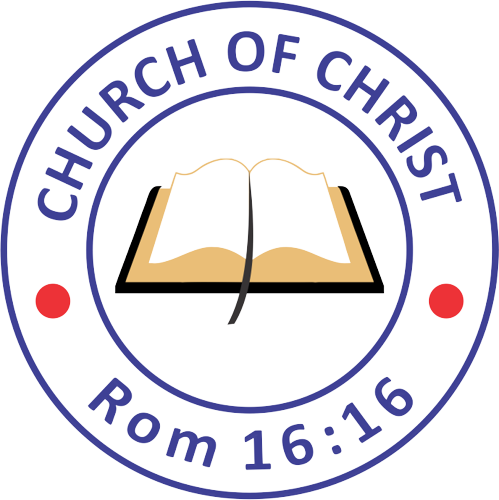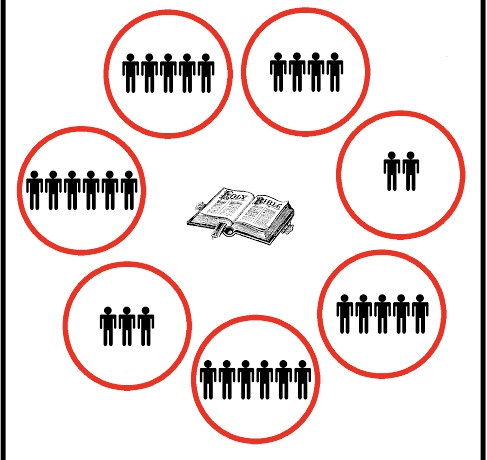

EPHESIANS 4:11-14
LESSON OUTLINE:
➢ Lesson objectives
➢ Introduction
➢ What is Church organization?
➢ Organization of the church in formation
➢ Organization of the church in leadership
➢ Organization of the church in worship
➢ Organization of the church in Discipline
➢ Organization of the church in Autonomy
➢ Organization of the church in membership
➢ Conclusion
LESSON OBJECTIVES
➢ This lesson is intended to show the standard of church organization God had designed for His church.
➢ It will further prepare us for leadership roles, discipline erring ones and help us to maintain membership landmark as stated in the scriptures.
INTRODUCTION
From the beginning, God of the Bible is an organized God. The sequence of events in Creation shows that God is organized. The light came first so that other things coming could use the light. Plants and animals came before man so that man would see what to eat and control. The family came first before the government so that the home would be an example of orderliness in governance. The church came last to correct all the mistakes the other institutions had made so that man will see God at last. The Bible explains how all these institutions mentioned above should be arranged so that life would be meaningful to all living and home will be sure. Different churches hold different views about church organization and work. It is obvious that the most common misuse of the phrase "church organization" is when referring to the many varied patterns of worship man has created. Another common misuse of "church organization" is when referring to how members are seated in the church worship hall.
WHAT IS CHURCH ORGANIZATION?
Church organization in the New Testament is the framework through which the Lord reveals how His church should be structured in leadership, worship, discipline, autonomy, membership etc.
ORGANIZATION OF THE CHURCH IN FORMATION
The Almighty God planned the formation of the church before the foundation of the world (Eph.3:9-11). In fact, Isaiah, Daniel, and Joel among other prophets of old, prophesized the establishment of the church (Isaiah 2:1-4; Daniel 2:44; Joel 2:28). John the Baptist preached about the coming of the kingdom of God soon (matt.3:2). Christ promised to build His church while on Earth and also called the church the kingdom (matt.16:18-19). And finally, the church came into existence on the first pentecost after the resurrection and ascension of Jesus (Acts 2).
ORGANIZATION OF THE CHURCH IN LEADERSHIP
God created the church just as He wanted her to be. He designed her government in a way that would best serve her in all ages. The church was intended to be the most organized institution on earth (1 Tim.3:15) However, it has been observed that the "Christendom" is the most confused set of organization. By divine plan, the church was planned to follow the arrangement stated below:
➢ CHRIST IS THE ONLY HEAD OF THE CHURCH: Christ is head over all things to His body, the church (Eph.1:22-23). When anyone claims to be the general overseer of a congregation, such an individual is putting himself in the position of Christ who is the head of the church. The church is “his body, of which he is the Savior” (Ephesians 5:23). Jesus’ relationship with the church is very close and loving, for “Christ loved the church and gave himself up for her” (Ephesians 5:25). He desires “to present her to himself as a radiant church, without stain or wrinkle or any other blemish, but holy and blameless” (Ephesians 5:27).
➢ EACH LOCAL CHURCH IS OVERSEEN BY ELDERS INDEPENDENTLY FROM OTHER CHURCHES
Elders or pastors or overseers or Bishop, oversee only the flock of God which is among them (1pet.5:2). They have no authority to intervene in the affairs of any other congregation. Each local church, as it matures, should appoint a plurality of qualified men to serve as elders (Acts 14:23; phi.1:1; 1 Tim.3:1-7; Titus 1:5-9). The elder oversee or shepherd the local church (Acts 20:17-18) assisted by the Deacons as servants (1 Tim.3:1-12; Titus 1:5-9). Evangelists are not restricted to serve only in a local congregation like the elders are not allowed to serve outside their local congregation. Teachers and other workers serve in the church (Eph.4:11-12).
➢ TEMPORARY LEADERS IN THE NEW TESTAMENT CHURCH
To equip and build the infant church, God appointed some to be Apostles and prophets (Eph.4:11-12). No one alive today meets the qualifications to be an apostle (Acts 1:21ff), and prophecy was a miraculous gift of the 1st century, and as such, it is no longer present. (Only apostles could pass on the ability to others to perform miracles, Acts 8:18).
ORGANIZATION OF THE CHURCH IN WORSHIP
Modernism and improvement is not allowed in the pattern clearly stated in the Bible. There are several warnings stated in the Bible that we are to stay with the doctrine of Christ and not add or remove (Rev.22:18-19; 2 John 7-9; 2 Tim.1:13; Phi.3:17). An organized worship according to the New Testament must have the following items:
➢ Singing- Eph.5:19, Col.3:17, Heb.13:5, 1 Cor.
➢ Prayer - Acts 2:42; 1 Thess 5:17
➢ Communion - Matt. 26:26, 1 Cor. 11:23, Acts 20:7
➢ Giving - 16:1-2
➢ Teaching - 2Tim. 2:15, Acts 2:42
ORGANIZATION OF THE CHURCH IN DISCIPLINE
The divine plan is that the church is to show the world the manifold wisdom of God as the ground and pillar of the truth. The church is planned to show the world what is right and that which is wrong. It is painful today that discipline is far from "Christendom" today. The church is made to set the standard of right and wrong on earth (matt.5:13-16). The church is to teach the principles of that which is right or wrong in the sight of God (Rom.12:1-2). The leadership of the church is to rebuke the wrong doers and encourage those who are right (2 Tim.4:1-4). She is to enforce discipline through disfellowship as the last resort to a wrong doer who refused to repent (Matt. 18:17; Rom.16:17; 1 Cor.5:13; 2 Thess.3:14; 2 John 10).
ORGANIZATION OF THE CHURCH IN AUTONOMY
The fundamental truth is often neglected by many who are tempted to inject themselves into the affairs of sister churches. For example: another congregation's choice for their preacher, what they pay him, whom they select for their eldership, special speakers they invited, their participation in some brotherhood, event they disapprove of, how their contribution will be spent, what project they will or will not support, what kind of meeting hall and where it will be located, etc. Every congregation in the New Testament was subject to no orders issued by others. One church cannot make financial assessment on another nor interfere in the affairs of another church. When a strong church helps a mission church, they did not try to exert control over its affairs after it is launched.
God planned the church to be autonomous that's, every congregation has the right to make decisions even if they are wrong. A congregation and its leaders answer only to God for their choices (Rom.14:4; 1 pet.4:15)).
WHAT AUTONOMY DOES NOT FORBID
➢ We do not violate autonomy when we share information with other churches or when we encourage them to do the right thing and reject error.
➢ Autonomy does not prohibit congregations from cooperating together. The church in Macedonia and Achaia cooperated in assisting the church in Jerusalem (2 Cor. 9:1-2)
➢ Autonomy does not prohibit sending members to visit and help other churches (Acts 11:22;25-26)
➢ Autonomy does not prohibit churches cooperated to reach agreement on right doctrine (Acts 15:1-35)
ORGANIZATION OF THE CHURCH IN MEMBERSHIP
God organized the membership of His church in such a way that no one can say he/she is a member without meeting membership requirements:
➢ One must hear the gospel of Christ (Rom. 10:17)
➢ One must believe the gospel of Christ (John 8:24)
➢ One must repent of his sin (Luke 13:3
➢ One must confess Christ as the son of God (Matt. 10:32)
➢ One must be baptized into Christ (Gal. 3:27, Col. 2:12)
Also believers are encouraged to be part of a local church and submit to its leadership (Heb.13:17, 1 Cor.12:12-31). God planned that each member develops and grows in a local setting or congregation (Acts 13:1-5; Phi.1:1).
CONCLUSION
➢ The divine pattern of church organization must be maintained as designed by God (Eph.4:11-14).
➢ We must always abide with the organized pattern of membership into His church (Rom.10:17, Jn.8:24, Luke 13:3, Matt. 10:32-33, Gal.3:27; Jn.3:5,7).
➢ Let's not be too comfortable with general monthly meeting and setting up committees as such is not a standard.
➢ Let's strive to scripturally organize our congregation for effective ministry
Posted by Bro-Edidiong-Friday
Sept. 15, 2024, 12:01 p.m.